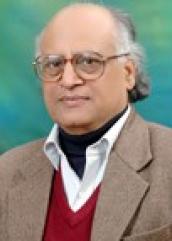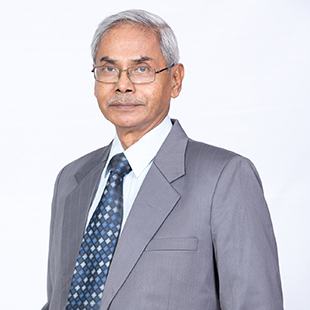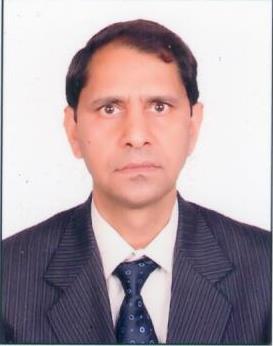Speaker 1

Generating Power Law Behaviour in Broadband Communication Networks
Prof. Karmeshu, Professor, School of Computer and Systems Sciences, Jawaharlal Nehru University, Delhi, India
Email: karmeshu@gmail.com
Dr. Karmeshu is Professor in School of Computer and Systems Sciences in the Jawaharlal Nehru University since 1986 and is currently Dean of the School of Computer and Systems Sciences and Dean, School of Computational and Integrative Sciences. Prior to joining JNU, he was a visiting scientist at University of Stuttgart Germany, visiting Assistant Professor, University of Waterloo, Canada, and visiting Professor National University of Mexico, Mexico. He is a founding Professor at NIIT University Neemrana, Rajasthan and Distinguished research Professor ITM University, Gurgaon. Dr. Karmeshu has published around 100 research papers in international journals. His work has been extensively cited in journals and books. Several books have devoted exclusive sections discussing his mathematical models and techniques as applied to the study of a variety of systems. Prof. Karmeshu has extensively given research seminars in Universities in Europe, Canada, USA and China. He has also delivered several memorial and endowment lectures including Platinum Jubilee lecture in section of Information & Communication Science, in Indian Science Congress 2009.
Speaker 2

Automated Human Activity Recognition from Video Clips
Prof. K. K. Biswas, Professor, Computer Science Engineering Department, IIT, Delhi, India
Email: kkb@cse.iitd.ernet.in
Prof K. K. Biswas did his Btech in Electrical Engineering from IIT Madras, followed by Mtech in Control systems and Phd in signal estimation from IIT Delhi. After a brief stint at University of Roorkee, he joined the EE deptt of IIT Delhi. He later shifted to Computer science engineering department where he is currently serving as a professor. His teaching career spans over 35 years. He has been a visiting professor at the University of Auckland, New Zealand and at the University of Central Florida, USA. He has also acted as UNESCO expert for development of curriculum at university of Nigeria.
He has been collaborating with University of Oxford and University of Texas at Austin. He has been an active researcher with 15 Phd students, and more than 60 publications in reputed journals and international conferences. His current area of research interest is image, video processing, machine learning with applications in activity recognition and salient object detection. His other main research interest is handling fuzzy models in probabilistic domain. He is also working in the area of logic based knowledge representation in scientific domains.
Speaker 3
A Short Tour of Randomized Techniques in Algorithm Design
Prof. Sandeep Sen, Professor, Computer Science and Engineering, IIT Delhi, India
Email: ssen@cse.iitd.ernet.in
Dr Sandeep Sen is a Professor of Computer Science and Engineering in IIT Delhi and a former Head of Dept. He obtained his PhD from Duke University in 1989, an MS from UC Santa Barbara in 1986 and B.Tech from IIT Kharagpur in 1984. He had held visiting positions in several organizations like IBM Research, Bell Laboratories, Microsoft Research, Max-Plank Institute, University of North Carolina, University of Connecticut and ISI Kolkata.
Speaker 4

A Short Tour of Randomized Techniques in Algorithm Design
Dr. Satish Chand, Professor, Deptt. of Computer Engineering, Netaji Subhas Institute of Technology, New Delhi, India
Email: schand20@gmail.com
Dr Satish Chand is working as Professor in Computer Engineering Department, Netaji Subhas Institute of Technology, Delhi. He did his M.Sc. in Mathematics from Indian Institute of Technology Kanpur, M.Tech. in Computer Science from Indian Institute of Technology Kharagpur, and Ph.D. in Computer Science from Jawaharlal Nehru University, Delhi. He works in different areas such as Image processing, Video processing, Digital watermarking, Wavelet applications, and Sensor networks. He has published about fifty papers in international journals, international and national conferences. He has been reviewing papers time-to-time for several international journals such as IEEE Transactions on Multimedia, IEEE Transactions on Broadcasting, IEEE Transactions on Circuits and systems for Video Technology, Communication Networks (Elsevier), Journal of Network and Computer application (Elsevier), Multimedia Systems (Springer), Journal of the Network and Systems Management (Springer), Technical Journal: Computer Engineering, Institute of Engineers (India) and many others. He has delivered talks at different places including Computer Science & Engg Department, IIT Kanpur and Electrical Engg, IISc Bangalore.
Invited Talk 5

A Short Tour of Randomized Techniques in Algorithm Design
Dr. Suneeta Agarwal, Professor and Head, Computer Science and Engineering Department, Motilal Nehru National Institute of Technology, Allahabad, India
Email: suneeta@mnnit.ac.inm
Suneeta Agarwal is a Professor and Head of the Computer Science and Engineering department , Motilal Nehru National Institute of Technology, Allahabad, India. She received BSc ,MSc & M.Tech(CS) degrees in 1973, 1975 and 2007 respectively. She did Ph.D from Indian Institute of Technology, Kanpur in 1980. So far she has guided five Ph.D students and seventy M.Tech students Eight Ph.D students are working with her at present. She has 33 years of teaching experience in the institute.
She has worked on development of robotics project sponsored by Ministry of Human Resources , Government of India. She is a member of professional bodies like IEEE, Indian Society of Technical Education (ISTE), New Delhi, and Computer Society of India (CSI). She has published a series of research papers on computer vision and image understanding, combinatorics, algorithm design, neural networks,data compression,operations research areas at reputed international journals and conferences. Apart from many national conferences she has presented her research papers in Georgia, Capetown, Singapore and Hongkong. In Singapore she has been awarded best research paper also.




